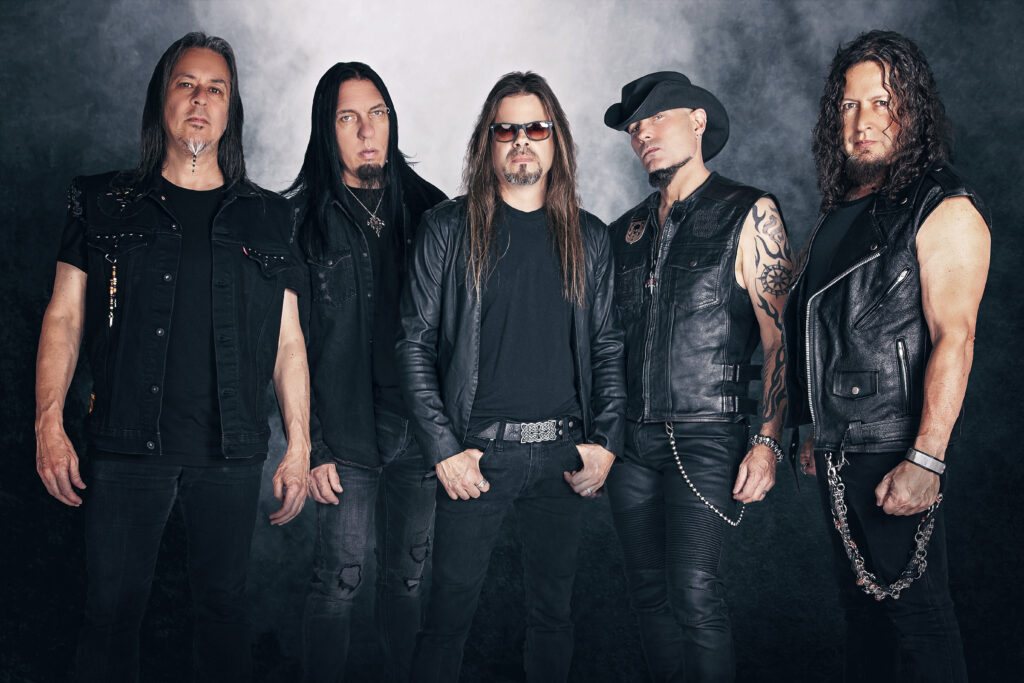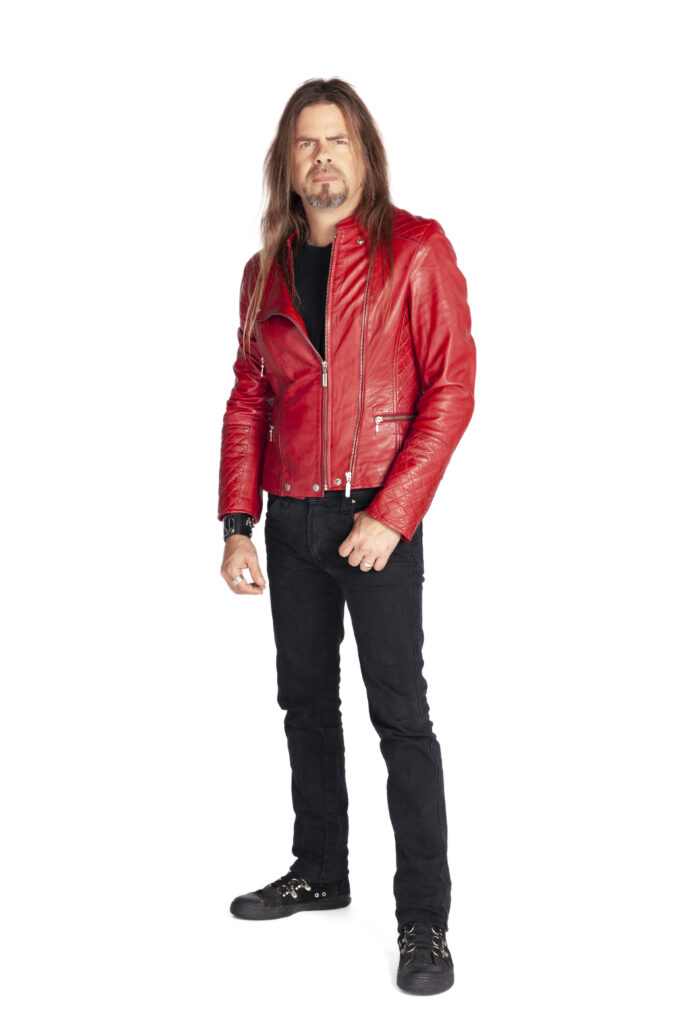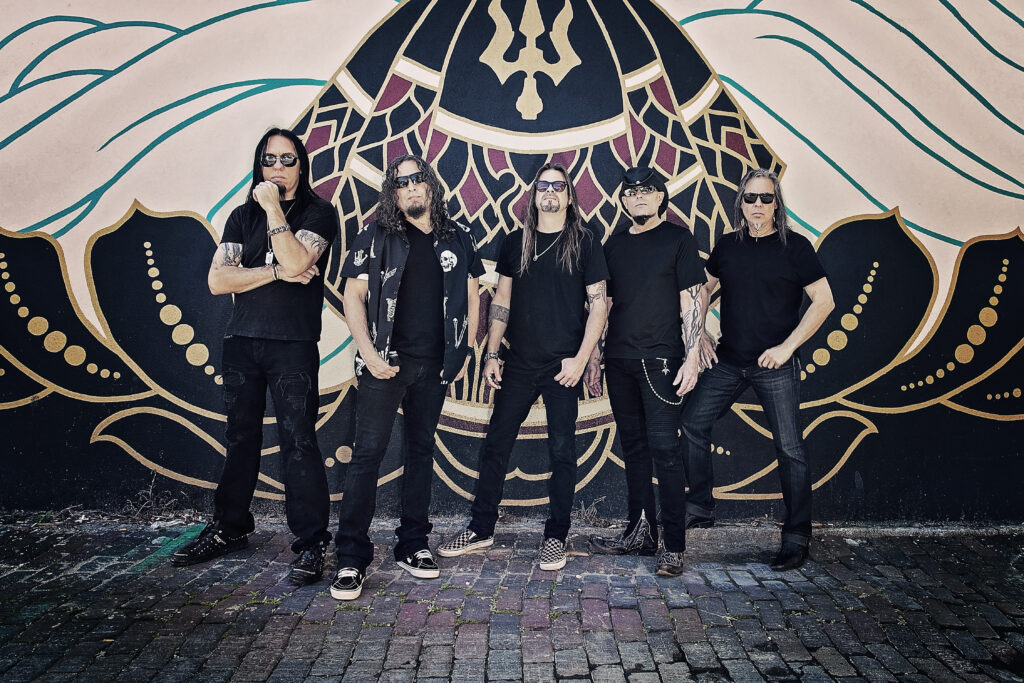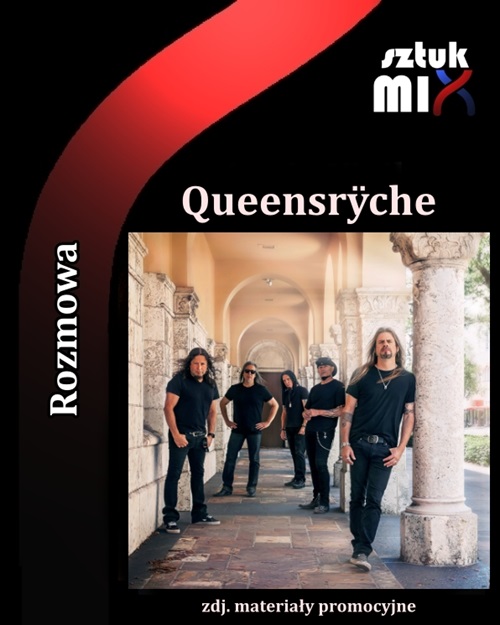English version below/Angielska wersja niżej !!!
Z nową muzyką na horyzoncie i energetyczną trasą w toku, Queensrÿche jest w świetnej formie, a polscy fani będą mogli się o tym przekonać na własne oczy podczas nadchodzącego koncertu w Warszawie – 25.02.2025 w Klubie Proxima! (BILETY). Origins Tour Queensrÿche przemierza Europę, a ja miałam okazję porozmawiać z Toddem La Torre o przeszłości i teraźniejszości zespołu. Rozmawialiśmy o decyzji, by zagrać w całości album „The Warning” oraz EPkę z 1983 roku, o wyzwaniach związanych z łączeniem ciągłego koncertowania z pracą nad nowym materiałem, a także o tym, jak jego rola w zespole ewoluowała na przestrzeni ostatnich 13 lat. Todd podzielił się również swoimi spostrzeżeniami na temat współczesnej branży muzycznej, zmieniającej się relacji z fanami oraz marzenia o wspólnej trasie koncertowej z Iron Maiden.
Ula Skowrońska-Malinowska: Europejska część trasy Origins Tour jest już w toku. Jak udaje ci się godzić koncertowanie z przygotowaniami do wejścia do studia i nagrywania nowego albumu?
Todd La Torre: To dobre pytanie. Dużo koncertowaliśmy, a do domu wróciliśmy pod koniec listopada. Mieliśmy więc kilka miesięcy przerwy zanim znowu wyruszyliśmy w trasę. Chłopaki przyjadą tutaj 20-go na sesję pisania piosenek z naszym producentem Zeusem. Spotkamy się na około tydzień – to będzie nasza pierwsza sesja pisania w pełnym składzie, podczas której zaczniemy wspólnie pracować nad utworami. Do tego czasu każdy z nas tworzył indywidualnie swoje pomysły. Zawsze trudno jest znaleźć czas na napisanie nowego albumu, bo – jak powiedziałaś – ciągle jesteśmy w trasie. A kiedy wracasz do domu, czasami twoje uszy i umysł potrzebują odpoczynku. Nie zawsze masz ochotę zajmować się muzyką 24 godziny na dobę. Musisz mieć poza tym życie. Niektórzy kochają to i mogą robić to bez przerwy, ale ja należę do osób, które potrafią odejść od tego na kilka miesięcy i być całkowicie szczęśliwy. Po prostu potrzebuję tej przerwy.
USM: Oczywiście, to całkowicie zrozumiałe…
TLT: …i bardzo potrzebne

USM: Co zainspirowało decyzję by podczas Origins Tour zagrać w całości zarówno EP-kę „1983”, jak i album „The Warning”?
TLT: Sporo koncertowaliśmy promując „Digital Noise Alliance”, a – jak wiadomo – większość zespołów utrzymuje się właśnie z tras koncertowych. Wszystko kręci się wokół występów na żywo. Cykl promocyjny tego albumu dobiegł końca, więc zaczęliśmy się zastanawiać, co możemy zrobić by znowu wyruszyć w trasę. Odkąd dołączyłem do zespołu trzynaście lat temu nigdy nie graliśmy żadnego albumu w całości. Zawsze graliśmy starsze utwory i klasyki z tych płyt, ale nigdy jako cały koncert. Zaczęliśmy więc rozmawiać o pomyśle zagrania „The Warning” w całości. Potem doszliśmy do wniosku, że sam w sobie nie jest wystarczająco długi, więc zdecydowaliśmy się dodać EP-kę i zagrać dwa pierwsze wydawnictwa. Kolejnym czynnikiem było to, że nasz były wokalista często koncertuje, gra całe albumy, ale te dwie płyty raczej omija. Może zagra z nich jeden lub dwa utwory, ale generalnie nie skupia się na nich. To sprawiło, że pomysł stał się dla nas jeszcze bardziej atrakcyjny – nie było przesytu, nikt inny tego nie robił. Wielu fanów starej szkoły uwielbia pierwsze pięć albumów, ale późniejsze płyty były grane na żywo dość często. To była okazja, aby wrócić do samego początku istnienia zespołu. Kiedy dołączyłem, zrobiliśmy trasę Return to History, na której graliśmy dużo starszego materiału z „The Warning”, „Rage for Order” i „Operation: Mindcrime”, plus kilka utworów z „Empire”. Ale to było coś innego – coś unikalnego, czego nigdy wcześniej nie robiliśmy i co jak wiedzieliśmy, docenią nasi fani. Zagraliśmy raz, wyszło świetnie, więc postanowiliśmy zrobić to ponownie. Nie byliśmy w Europie od listopada 2019 roku z powodu COVID-u, a za każdym razem, gdy próbowaliśmy wrócić, pojawiały się trudności z organizacją. Teraz, po pięciu latach, wszystko ułożyło się idealnie. Europejska publiczność naprawdę kocha i docenia stary materiał. Już mamy kilka wyprzedanych koncertów, a przedsprzedaż wygląda świetnie. Myślę, że to będzie niesamowita trasa.
USM: Jestem pewna, że tak będzie! Wspomniałeś o czymś, co wiąże się z moim kolejnym pytaniem: Jesteś w zespole od ponad dekady. Jak myślisz, w jaki sposób rozwinąłeś się w tej roli, a jak zmieniła się twoja relacja z fanami?
TLT: Tak, to już 13 lat. Oficjalnie dołączyłem w czerwcu lub lipcu 2012 roku, a ten nadchodzący album będzie moim piątym z zespołem. Na początku wśród fanów istniał wyraźny podział – ludzie czuli, że muszą wybrać stronę. Ale minęło już tyle czasu, że zarówno Geoff, jak i my koncertujemy, więc fani mogą zobaczyć oba składy, jeśli chcą – to więcej muzyki do cieszenia się. Z biegiem lat wielu fanów się do nas przekonało. Niezliczona liczba osób podchodziła do mnie i mówiła: „Hej, chcę cię przeprosić. Kiedyś mówiłem o tobie same złe rzeczy. Nie dałem ci szansy, ale w końcu przyszedłem na koncert i byłem zachwycony.” Usłyszenie czegoś takiego wiele znaczy, bo pokazuje, że przekonaliśmy ludzi po prostu robiąc swoje. Myślę, że kiedy dołączyłem odzyskaliśmy wielu fanów, którzy się od nas oddalili. Większość publiczności Queensrÿche wspiera ten skład, choć oczywiście zawsze znajdą się ludzie, którzy nas nie lubią – albo mnie konkretnie. Ale nie przejmuję się tym.
USM: … nie da się zadowolić wszystkich
TLT: Dokładnie. A szczerze mówiąc ludzie, którzy najwięcej narzekają, to często osoby, które po prostu chcą być negatywne, może dlatego, że są nieszczęśliwe w swoim życiu. Ale w większości przypadków fani zaakceptowali to co robimy. Naprawdę poczułem się częścią zespołu. Mam równy głos w podejmowaniu decyzji i odgrywam dużą rolę w procesie twórczym – od artworku po koncepcje teledysków. Michael i Eddie często mówią: „Hej, zawsze świetnie sobie radzisz, więc ci ufamy”. Taka wiara we mnie wiele znaczy, a ja zawsze konsultuję się z nimi, aby upewnić się, że wszyscy jesteśmy po tej samej stronie. Niektóre zespoły traktują nowych członków jak najemników – mówią im w co mają się ubierać, co mówić i nie pozwalają im brać udziału w pisaniu utworów. U nas tak nie jest. Gdyby tak było, nie byłoby mnie w zespole. Wolałbym w ogóle tego nie robić, niż być w sytuacji, gdzie nie mam na nic żadnego wpływu.

USM: To fantastyczne! Fani naprawdę potrafią wyczuć kiedy zespół jest zgrany, kiedy to co robi jest szczere, a to sprawia, że łatwiej im zaakceptować skład.
TLT: Absolutnie. Niektóre starsze zespoły wymieniają członków i traktują ich jak muzyków sesyjnych, ale my jesteśmy prawdziwym zespołem. Każdy jest zaangażowany, a to robi ogromną różnicę.
USM: Wracając do trasy – jaki był twój ulubiony moment na scenie podczas Origins Tour? Są jakieś utwory, które szczególnie lubisz wykonywać?
TLT: Jeśli chodzi o Origins Tour? Hmm. To trudne pytanie. Nie ma jednego konkretnego momentu, ale na pewno są pewne wyróżniające się chwile. Początek koncertu jest zawsze ekscytujący. Mamy naprawdę fajne intro, w którym pojawia się tekst z oryginalnego teledysku „Queen of the Reich”, przewijający się na ekranie w stylu „Gwiezdnych Wojen”. To świetny sposób na rozpoczęcie show. Potem, kiedy zaczynamy set „The Warning”, zmieniamy wygląd sceny – tło przechodzi na grafikę albumu, co wygląda świetnie. Jeśli chodzi o ulubione utwory, uwielbiam grać „Roads to Madness” w całości. „Before the Storm” też jest świetny, choć wymagający wokalnie. Podobnie jak „No Sanctuary” – te utwory wymagają dużej kontroli, a jeśli masz przeziębienie lub zmęczony głos mogą być naprawdę trudne. „Blinded” to kolejny kawałek, który uwielbiam. Jest po prostu super energiczny. Wiele z tych utworów nigdy wcześniej nie było częścią naszego setu, więc fajnie jest wreszcie je ożywić na scenie. Ogólnie rzecz biorąc, to niesamowite doświadczenie i nie możemy się doczekać, aby kontynuować trasę.
USM: Skoro już poruszyłeś temat pisania piosenek – jak zmieniło się Twoje podejście do tworzenia tekstów i melodii od momentu dołączenia do zespołu? Już trochę o tym mówiłeś, ale czy od początku miałeś równy udział w tym procesie, czy może zmieniało się to z czasem?
TLT: Tak, od samego początku chłopaki pisali muzykę i przekazywali mi utwory, a ja pracowałem nad tekstami i melodiami. Prawie zawsze jednak Eddie pisze swoje własne piosenki – tworzy zarówno teksty jak i melodie. Nie komponuje tylko dla Queensrÿche, ale po prostu pisze muzykę. Często ma już gotowe wersje i mówi: „Hej, napisałem ten kawałek, posłuchaj i powiedz co myślisz”. Potem pokazuje mi swoje teksty i melodie. Jego sposób frazowania jest zupełnie inny niż Queensrÿche – bardzo charakterystyczny. Więc jeśli decyduję się zostawić to co stworzył, muszę wykorzystać swój styl i sposób interpretacji, aby nadal brzmiało to jak Queensrÿche. Ale Eddie jest otwarty na zmiany—mówi: „Jeśli coś ci nie pasuje, możemy to poprawić, dostosować”. Od samego początku pisałem także na pierwszy album, który nagrałem z zespołem. Stworzyłem większość partii perkusyjnych na demach. Pamiętam, że zapytałem Scotta: „Hej, nie masz nic przeciwko jeśli to zrobię? Nie chcę wchodzić ci w drogę, ale chłopaki chcą, żeby partie perkusji były już na wczesnym etapie, żeby ukształtować utwory”. Był z tym całkowicie okej. Na „Condition Hüman” działo się to bardzo często, a potem nagrałem wszystkie partie perkusji na „The Verdict”. Jeśli chodzi o wokale, prawie zawsze dostaję gotowe utwory i piszę do nich teksty oraz melodie. Jeśli utknę, zazwyczaj najpierw kontaktuję się z Eddie’em, bo jest świetny w komponowaniu linii melodycznych. Często pracujemy nad tym razem. Ale wszyscy w zespole wnoszą swój wkład w różny sposób – Casey czasem wymyśla teksty i melodie, Michael sugeruje pomysły na perkusję, a ja czasem pokazuję Michaelowi partie gitarowe. Wspieramy się nawzajem, ale nikt nie mówi nikomu jak ma grać na swoim instrumencie. Najważniejsze jest stworzenie jak najlepszej piosenki. Szczerze mówiąc moje podejście nie zmieniło się z czasem – od samego początku wyglądało to właśnie tak. Powiedzieli mi: „Jesteś w tym zespole, bo wierzymy w ciebie jako autora tekstów, nie tylko jako wokalistę”. Zawsze miałem tę swobodę i komfort.

USM: Wiele waszych albumów porusza tematy społeczne i polityczne. Czy uważasz, że przekaz zespołu zmienił się z czasem, czy pozostał spójny?
TLT: Myślę, że pozostał spójny. Mamy wiele utworów, które nie są polityczne—jak „Jet City Woman” czy „Eyes of a Stranger”. Ale tak, polityka i problemy społeczne zawsze były obecne w twórczości Queensrÿche. Jestem bardzo świadomy tego, co dzieje się na świecie. Właśnie teraz mam wstrzymany program w telewizji – oglądałem przesłuchania Senatu dotyczące zatwierdzenia nowego Sekretarza Obrony. Uważnie śledzę politykę. Szczerze mówiąc nienawidzę jej, ale jednocześnie mnie fascynuje. Staram się być na bieżąco, nie tylko w kontekście USA, ale też Europy, a do pewnego stopnia również Ameryki Południowej. Tematyka naszych tekstów pozostaje niezmienna – relacje międzyludzkie, przemijanie, czas, a także kwestie społeczne i polityczne. Nawet jeśli teksty nie są dosłowne, te motywy zawsze są obecne.
USM: Skoro wspomnieliśmy o nowym albumie, czy możesz zdradzić więcej na temat jego kierunku artystycznego? Czy planujecie premierę w 2025 roku?
TLT: Nie wiem czy uda się wydać go w tym roku. Wytwórnia mówi, że od momentu ukończenia nagrań do wydania albumu mija zwykle około dziewięciu miesięcy. Proces produkcji, zwłaszcza w przypadku winyli oraz wszystkie logistyczne kwestie zabierają dużo czasu. Więc wątpię żeby płyta ukazała się w 2025 roku – chyba, że wydarzy się coś niespodziewanego. Jeśli chodzi o tematykę, nie podchodzimy do tego jako albumu koncepcyjnego. Niektórzy fani sugerowali, że powinniśmy nagrać koncept-album, co jest ciekawą opcją, bo wtedy fabuła pomaga kształtować nastrój utworów. Jeśli mamy smutniejszą część historii muzyka może to odzwierciedlić. Na ten moment po prostu zbieramy się razem, słuchamy pomysłów Michaela, nagrywamy je z producentem i pozwalamy Casey’emu budować groove wokół nich. Ja niedługo skupię się na tworzeniu utworów, by móc je potem analizować i opracowywać melodie oraz teksty.
USM: Jak radzicie sobie z wyzwaniami współczesnej branży muzycznej, zwłaszcza w kontekście cyfrowej dystrybucji, która wpływa na sprzedaż albumów i konieczność intensywnego koncertowania?
TLT: Żadne cyfrowe doświadczenie nie zastąpi koncertu na żywo. Ludzie mogą kraść muzykę, ripować MP3 i streamować za darmo, co jest frustrujące, bo tworzenie albumu wymaga ogromnego nakładu pracy. Tysiące dolarów i godzin poświęca się na pisanie, nagrywanie, teledyski, marketing i trasy koncertowe. Dawniej sprzedaż płyt pozwalała muzykom odpocząć i skupić się na komponowaniu najlepszej możliwej płyty. Teraz zarobki ze sprzedaży albumów są śmiesznie niskie w porównaniu do przeszłości. Z zasady nie korzystam ze Spotify ani innych serwisów streamingowych. Wiem, że to wygodne, ale gdy dostajesz ułamek centa za jedno odtworzenie, to po prostu brak szacunku. Na szczęście nasza grupa demograficzna nadal wspiera artystów kupując fizyczne kopie albumów. Ludzie, którzy kochają muzykę, chcą mieć winyl lub CD. Młodsze pokolenie głównie streamuje, co jest zrozumiałe, ale myślę, że posiadanie fizycznej kopii ma w sobie coś wyjątkowego – można zobaczyć okładkę, przeczytać książeczkę i doświadczyć albumu tak, jak został zaplanowany.
USM: Jakie masz marzenia i cele związane z Queensrÿche? Jakie są wasze plany na przyszłość?
TLT: Wiesz co bym chciał? Queensrÿche zaczynało od kilku koncertów, zanim dostali kontrakt, a potem ruszyli w trasę z Twisted Sister, Dio, Def Leppard, AC/DC, Ozzym i Iron Maiden, zanim sami zaczęli grać na arenach. Graliśmy ze Scorpions i Judas Priest, ale marzę o pełnej trasie z Iron Maiden, zanim te zespoły przejdą na emeryturę. Queensrÿche miało tylko kilka koncertów z Maiden, nigdy pełnej trasy. Byłoby niesamowite wrócić na scenę razem po czterdziestu latach. Jeśli to się nie wydarzy, już i tak spełniłem wszystkie swoje marzenia. Ale uważam, że wielka trasa wspierająca Iron Maiden lub Judasów pokazałaby, że nadal dajemy radę na scenie.
USM: To niesamowita wizja – mam nadzieję, że się spełni!
TLT: Dziękuję bardzo.
USM: Powodzenia na trasie!
TLT: Dzięki! Wkrótce będziemy w Polsce.
USM: Wiem! Do zobaczenia!
TLT: Super! Miłego wieczoru!
USM: Dziękuję, nawzajem!
Rozmawiała Ula Skowrońska-Malinowska
English version
With new music on the horizon and an electrifying tour underway, Queensrÿche is as strong as ever and Polish fans can experience it firsthand when the band hits Warsaw for a highly anticipated show – 25.02.2025 in Proxima Club! (TICKETS). As Queensrÿche’s Origins Tour makes its way through Europe, I had the chance to sit down with Todd La Torre to discuss the band’s journey, both past and present. We talked about the decision to perform The Warning and 1983 EP in full, the challenges of juggling constant touring with writing a new album, and how his role in the band has evolved over the past 13 years. Todd also shared his thoughts on the modern music industry, the changing relationship with fans, and his dream of one day touring with Iron Maiden.
Ula Skowronska-Malinowska: The European leg of the „Origins Tour” is already underway. How do you manage to balance touring with preparing to enter the studio and record a new album?
Todd La Torre: That’s a good question. We’ve been touring a lot, and we came back home at the end of November. So we had a few months off before hitting the road again. The guys will come here on the 20th for a songwriting session with our producer Zeus. We’ll meet for about a week – this will be our first full-band writing session where we start working on songs together. Until now, each of us has been working individually on our ideas. It’s always hard to find time to write a new album because, as you said, we’re constantly on the road. And when you come back home, sometimes your ears and mind just need a break. You don’t always feel like doing music 24/7. You need to have a life outside of it. Some people love it and can do it non-stop, but I’m one of those who can step away for a few months and be perfectly happy. I just need that break.
USM: Of course, that makes perfect sense…
TLT: …and it’s absolutely necessary.

USM: What inspired the decision to play both the „1983” EP and „The Warning” album in their entirety during the „Origins Tour”?
TLT: We did a lot of touring to promote „Digital Noise Alliance”, and as you know, most bands make a living from touring. It’s all about the live shows. The promotional cycle for that album was coming to an end, so we started thinking about what we could do to hit the road again. Since I joined the band 13 years ago, we’ve never played a full album from start to finish. We’ve always performed older songs and classics from those records, but never as a complete show. So, we started talking about the idea of playing „The Warning” in full. Then we realized it’s not long enough on its own, so we decided to add the EP and play the first two releases. Another factor was that our former vocalist often tours and plays entire albums, but he tends to skip these two records. He might do one or two songs from them, but they’re generally overlooked. That made the idea even more appealing – there was no oversaturation, and no one else was doing it. Many old-school fans love the first five albums, but later records have been performed live quite often. This was a chance to go back to the band’s very beginnings. When I joined, we did the „Return to History” tour, where we played a lot of older material from „The Warning”, „Rage for Order”, and „Operation: Mindcrime”, plus a few „Empire” tracks. But this was different – something unique that we’d never done before and that we knew our fans would appreciate. We did one show, it went great, so we decided to do it again. We haven’t been to Europe since November 2019 because of COVID, and every time we tried to come back, there were logistical issues. Now, after five years, it finally worked out. European audiences really love and appreciate the old material. We already have some sold-out shows, and ticket pre-sales look fantastic. I think it’s going to be an amazing tour.
USM: I’m sure it will be! You mentioned something that connects with my next question: You’ve been with the band for over a decade now. How do you think you’ve evolved in this role, and how has your relationship with the fans changed?
TLT: Yeah, it’s been 13 years now. I officially joined in June or July 2012, and this next album will be my fifth with the band. At the beginning, there was a clear divide among the fans – people felt like they had to pick a side. But so much time has passed that both Geoff and we are touring, so fans can see both lineups if they want to – that’s more music to enjoy. Over the years, many fans have come around. Countless people have come up to me and said, „Hey, I want to apologize. I used to say all these bad things about you. I didn’t give you a chance, but then I came to a show and was blown away.” Hearing something like that means a lot because it shows we won people over by simply doing our thing. I think when I joined, we brought back a lot of fans who had drifted away. Most of Queensrÿche’s audience supports this lineup, although of course, there will always be people who don’t like us – or me specifically. But I don’t let it get to me.
USM: …you can’t please everyone.
TLT: Exactly. And honestly, the people who complain the most are often just being negative because they’re unhappy in their own lives. But for the most part, fans have accepted what we’re doing. I really feel like part of the band now. I have an equal say in decisions and play a big role in the creative process – from artwork to video concepts. Michael and Eddie often say, „Hey, you always do a great job, so we trust you.” Having that trust means a lot, and I always check in with them to make sure we’re on the same page. Some bands treat new members like hired guns – they tell them what to wear, what to say, and don’t let them contribute to songwriting. That’s not the case with us. If it were, I wouldn’t be here. I’d rather not do it at all than be in a situation where I have no influence.

USM: That’s fantastic! Fans can really sense when a band is in sync and genuine about what they do, and that makes it easier for them to accept the lineup.
TLT: Absolutely. Some older bands swap out members and treat them like session musicians, but we are a real band. Everyone is involved, and that makes a huge difference.
USM: Coming back to the tour – what has been your favorite moment on stage during the „Origins Tour”? Are there any songs you particularly enjoy performing?
TLT: From the „Origins Tour”? Hmm. That’s a tough one. There’s no single moment, but there are definitely standout parts. The start of the show is always exciting. We have a really cool intro that features the original text from the „Queen of the Reich” video, scrolling on the screen like „Star Wars”. It’s a great way to kick things off. Then, when we start „The Warning” set, the stage visuals change – the backdrop shifts to the album cover, and it looks awesome. As for favorite songs, I love playing „Roads to Madness” in its entirety. „Before the Storm” is another favorite, though it’s vocally demanding. The same goes for „No Sanctuary” – these songs require a lot of control, and if you have a cold or tired voice, they can be really tough. „Blinded” is another one I enjoy. It’s just super high-energy. A lot of these tracks have never been part of our live set before, so it’s fun to finally bring them to life on stage. Overall, it’s been an amazing experience, and we can’t wait to keep the tour going.
USM: Since you brought up songwriting – how has your approach to writing lyrics and melodies changed since you joined the band? You’ve mentioned it a bit, but did you have an equal role in the process from the start, or did it evolve over time?
TLT: Yeah, from the very beginning, the guys wrote the music and gave me the tracks, and I worked on the lyrics and melodies. Almost always, though, Eddie writes his own songs – both the lyrics and melodies. He doesn’t just write for Queensrÿche; he just loves writing music. He often comes to me with finished versions and says, „Hey, I wrote this track, listen to it and tell me what you think.” Then he shows me his lyrics and melodies. His phrasing is very different from what you’d typically hear from Queensrÿche – very distinctive. So, if I decide to keep what he’s created, I need to apply my style and interpretation to make sure it still sounds like Queensrÿche. But Eddie is open to changes. He’ll say, „If something doesn’t feel right, we can tweak it or adjust it.” From the start, I was also writing for the first album I recorded with the band. I created most of the drum parts on the demos. I remember asking Scott, „Hey, would you mind if I did that? I don’t want to step on your toes, but the guys want the drum tracks laid down early to help shape the songs.” He was totally fine with it. That happened quite a bit on „Condition Hüman”, and then I recorded all the drum parts on „The Verdict”. When it comes to vocals, I almost always get the music first and then write the lyrics and melodies. If I get stuck, I’ll usually reach out to Eddie because he’s great at crafting vocal lines. We often collaborate on that. But everyone in the band contributes in different ways – Casey sometimes comes up with lyrics and melodies, Michael suggests drum ideas, and I occasionally show Michael guitar parts. We support each other, but no one tells anyone else how to play their instrument. The main goal is to write the best possible song. Honestly, my approach hasn’t really changed over time – it’s always been like that. They told me from day one: „You’re in this band because we believe in you as a songwriter, not just as a vocalist.” I’ve always had that freedom and trust.

USM: Many of your albums address social and political issues. Do you think the band’s message has evolved over time, or has it remained consistent?
TLT: I think it’s remained consistent. We have plenty of songs that aren’t political, like „Jet City Woman” or „Eyes of a Stranger”. But yes, politics and social issues have always been present in Queensrÿche’s music. I’m very aware of what’s happening in the world. Right now, I have the TV on pause – I was watching a Senate hearing about confirming the new Secretary of Defense. I follow politics closely. Honestly, I hate it, but at the same time, I’m fascinated by it. I try to stay informed, not just about the U.S., but also Europe and, to some extent, South America. The themes in our lyrics haven’t really changed – relationships, the passage of time, and societal and political matters. Even when the lyrics aren’t literal, those elements are always present.
USM: Since we’re on the topic of the new album, can you share anything about its artistic direction? Are you aiming for a 2025 release?
TLT: I’m not sure if it’ll come out this year. The label says it usually takes about nine months from the time we finish recording to the release date. The production process, especially with vinyl, along with all the logistical details, takes a lot of time. So, I doubt the album will be out in 2025 unless something unexpected happens. As for the direction, we’re not treating it as a concept album. Some fans have suggested we should do one, and it is an interesting idea because the story helps shape the mood of the songs. If the narrative takes a darker turn, the music can reflect that. But for now, we’re just gathering together, listening to Michael’s ideas, recording them with our producer, and letting Casey build grooves around them. I’ll soon focus more on shaping the tracks, so I can work on the melodies and lyrics.
USM: How do you cope with the challenges of the modern music industry, especially in terms of digital distribution impacting album sales and the need to tour so extensively?
TLT: Nothing digital can replace a live concert. People can steal music, rip MP3s, and stream songs for free, which is frustrating because making an album requires so much effort. You invest thousands of dollars and hours into writing, recording, filming videos, marketing, and touring. Back in the day, album sales allowed musicians to take breaks and focus on writing the best possible record. Now, album revenue is laughably low compared to the past. I don’t use Spotify or other streaming services out of principle. I know they’re convenient, but when you get a fraction of a cent per stream, it’s just disrespectful. Thankfully, our demographic still supports artists by buying physical copies. People who love music want vinyl or CDs. Younger generations mostly stream music, which is understandable, but I think there’s something special about holding a physical album – seeing the artwork, reading the booklet, and experiencing the record the way it was meant to be.
USM: What are your dreams and goals with Queensrÿche? What are your plans for the future?
TLT: You know what I’d love? Queensrÿche started out playing a handful of shows before getting signed and then toured with Twisted Sister, Dio, Def Leppard, AC/DC, Ozzy, and Iron Maiden before they started headlining arenas. We’ve toured with Scorpions and Judas Priest, but my dream is to do a full tour with Iron Maiden before these bands retire. Queensrÿche only played a few shows with Maiden – never a full tour. It would be amazing to share the stage again after 40 years. If that doesn’t happen, I’ve already fulfilled every dream I had. But I believe a big tour with Iron Maiden or Priest would prove that we can still deliver on stage.
USM: That’s an incredible vision – I hope it comes true!
TLT: Thank you so much.
USM: Good luck with the tour!
TLT: Thanks! We’ll see you in Poland soon.
USM: I know! See you then!
TLT: Awesome! Have a great evening!
USM: Thank you, you too!
Ula Skowrońska-Malinowska
Obserwuj nas w mediach społecznościowych:


